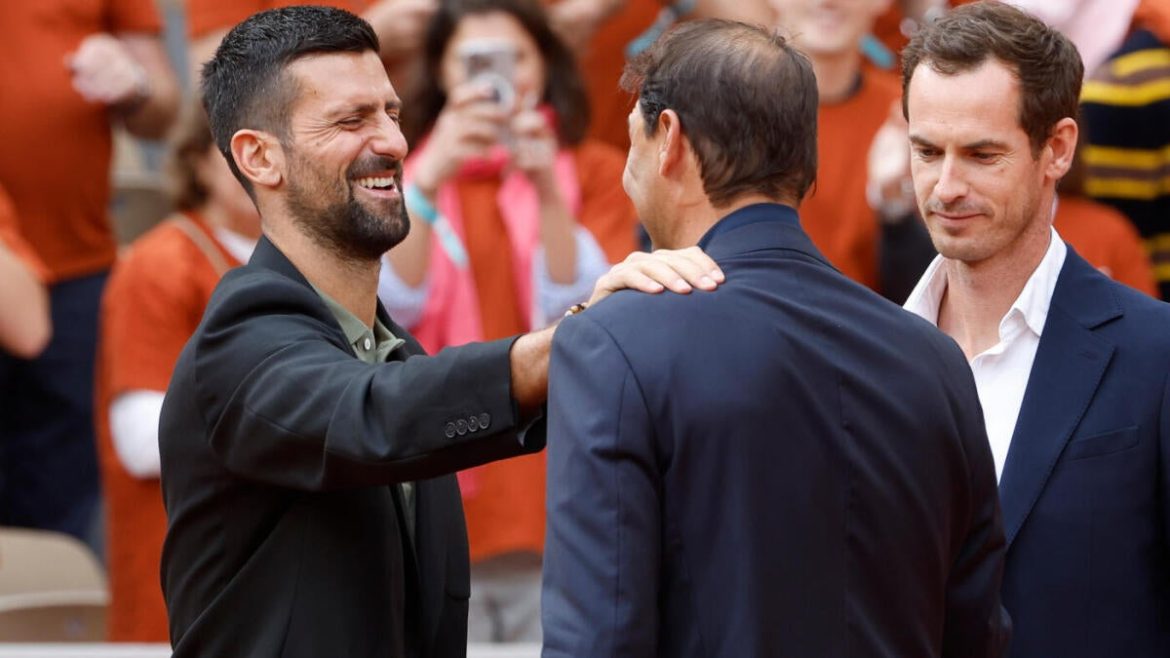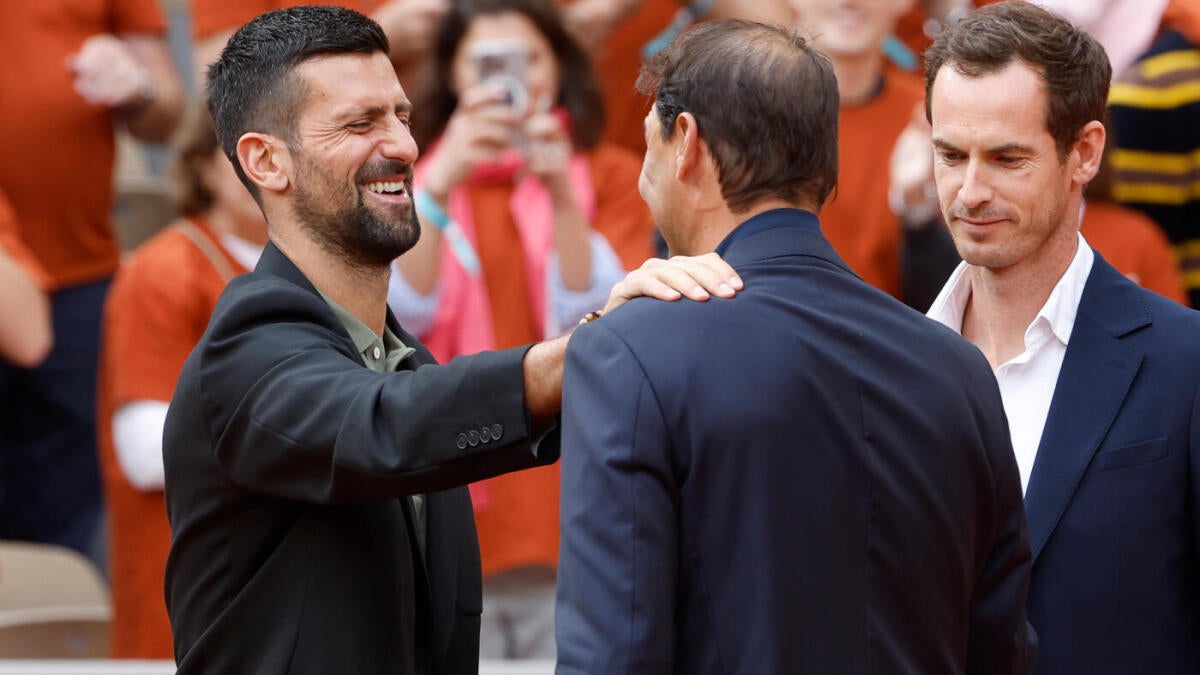Novak Djokovic’s Reflection on Retirement and the Transition of Tennis’ Golden Era
As the tennis world witnesses the closing chapters of a remarkable epoch, Novak Djokovic finds himself at a crossroads—reflecting on his own future in the sport amid the farewell of some of his greatest contemporaries. The recent events at the 2025 French Open, particularly the emotional tribute to Rafael Nadal, offer a poignant backdrop to Djokovic’s introspections and the shifting landscape in men’s tennis.
The End of an Era: Nadal’s Farewell Ceremony and the “Big Four” Legacy
Rafael Nadal’s farewell ceremony at Roland Garros deeply resonated among fans and players alike. Nadal, a record 14-time champion at the French Open and a defining figure in clay court tennis, was honored by his key rivals: Roger Federer, Novak Djokovic, and Andy Murray—each a titan of the sport and collectively regarded as the “Big Four.” This reunion at the iconic Court Philippe-Chatrier not only celebrated Nadal’s unparalleled achievements but also underscored the profound rivalries and mutual respect that elevated men’s tennis for well over a decade.
The ceremony powerfully evoked nostalgia and recognition of the golden era these four players created. Roger Federer, Djokovic, and Murray’s presence marked a symbolic passing of the torch, as the three other members of this elite group have all retired or are approaching retirement. Nadal’s emotional response and tributes he paid to his contemporaries emphasized how intertwined their careers and accomplishments have been.
Djokovic’s Introspection: Contemplating His Own ‘End of the Road’
While engaging with Nadal, Federer, and Murray during the ceremony, Djokovic revealed candidly that the gathering prompted him to think about his own retirement timeline. Though Djokovic, at 38, continues to compete at the highest levels and has recently secured his 100th ATP Tour singles title, he openly admitted facing a decline in form and motivation, especially in the absence of Nadal.
This reflective mood is coupled with a realism about the physical and mental demands of elite competition after decades on tour. Djokovic has experienced a series of challenging performances in recent clay tournaments, such as Monte Carlo and Madrid, and recognizes that his competitive edge and motivation have been tested in this new phase of his career.
Nonetheless, Djokovic remains committed to pursuing excellence, aiming for a record 25th Grand Slam title and a possible fourth Roland Garros victory. His determination, albeit tempered by an awareness of his own career’s finite nature, embodies the complex emotions athletes face as they navigate the twilight of their sporting lives.
The Shifting Competitive Landscape Post-Big Four
Nadal’s retirement accentuates the transition to a new era in men’s tennis, marked by increased uncertainty. The departures of Federer, Nadal, and Murray leave Djokovic as the last standing member of their dominant generation still competing regularly. This signals a changing of the guard where new champions and challengers must emerge to fill the void left by these legends.
Djokovic’s recent announcement about limiting participation in smaller ATP Tour events and focusing selectively on major tournaments reflects a strategic recalibration as he manages his physical condition and career longevity. It also highlights the tug-of-war between maintaining competitiveness and preserving energy for Grand Slams.
As the tennis world adapts to this evolving scene, Djokovic’s role as a veteran stalwart has become more poignant. His resilience and experience offer a benchmark for emerging players, even as fans and analysts ponder how long he and players of his generation can continue to defy age and diminish declines in performance.
Motivational Challenges and Psychological Dynamics
A noteworthy insight shared by Djokovic is the challenge he faces in staying motivated without Nadal actively competing. The friendly rivalry with Nadal historically spurred Djokovic to push boundaries and elevate his game, providing a psychological stimulus that often defines sporting greatness.
With Nadal’s retirement removing that particular benchmark, Djokovic admits to a sense of lost motivation and the need to redefine his competitive goals and sources for inspiration. This theme is common among athletes concluding significant chapters of their careers: the pursuit of reinvention and the management of evolving ambitions.
Djokovic’s Outlook on Nadal’s Possible Return
Despite widespread views regarding Nadal’s retirement, Djokovic remains optimistic or at least open to the possibility that Nadal could return to compete at the French Open in 2025. Their rivalry, characterized by 59 career meetings—10 at Roland Garros alone—has been pivotal in shaping modern tennis history. Djokovic’s comments reflect his confidence in Nadal’s enduring passion for the sport and suggest that the narrative of retirements and comebacks in tennis remains fluid and unpredictable.
Conclusion: The Twilight of the Titans and the Dawn of New Rivalries
Novak Djokovic’s reflections during Nadal’s farewell encapsulate more than personal contemplation; they symbolize the natural progression in professional sports where legends eventually pass the mantle to the next generation. The 2025 French Open serves as a poignant milestone marking the close of a golden chapter in men’s tennis.
Djokovic, amid fluctuating form and motivation, personifies the complex balance between legacy and longevity. His openness about retirement considerations amidst the camaraderie of great rivals adds a deeply human dimension to the saga of competitive sports. As tennis looks forward, the intertwined stories of Djokovic, Nadal, Federer, and Murray will continue to inspire, reminding fans that greatness is often measured not only by titles but also by the relationships, rivalries, and memories forged on and off the court.
—
Reflect on Djokovic’s epic tennis journey and the end of an era with us—celebrate legends and new beginnings now!





